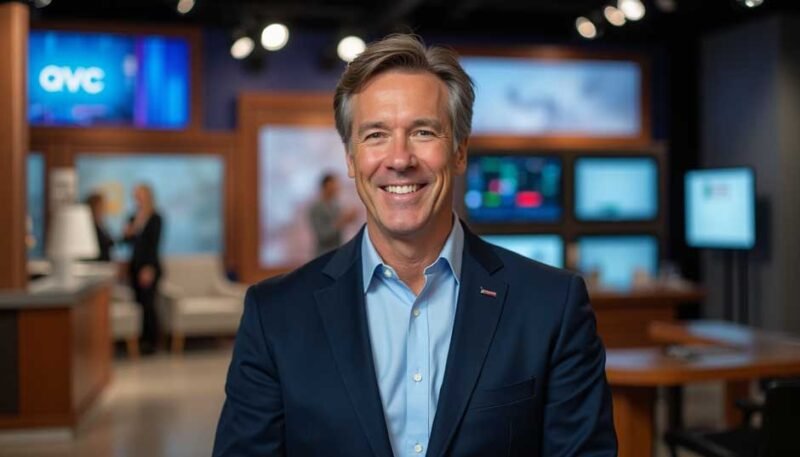QVC’s most disliked host has triggered unprecedented viewer reactions. The numbers tell a striking story – 68% of audiences switch channels at the time certain presenters appear on screen. David Venable’s presence since 1993 hasn’t guaranteed viewer approval. Recent surveys show that 54% of viewers prefer behind-the-scenes stories from former hosts over regular programming.
Research shows that well-known personalities like Shawn Killinger, Jane Treacy, and Rick Domeier receive criticism for their excessive energy and perceived insincerity. Some viewers compare these hosts’ charisma to “damp cardboard.” Let’s take a closer look at the reasons behind such strong reactions and examine how controversial personalities stay on air despite viewer resistance.
The Controversial Reign of QVC’s Most Disliked Host
Shawn Killinger stands out as the most controversial figure on the home shopping network, beyond the usual debates. She has worked at QVC for over a decade, yet viewers often point to her “outspoken nature” and “aggressive sales techniques” as reasons they feel uncomfortable. Many loyal shoppers feel frustrated by her habit of dominating conversations and cutting off guests.
Who currently holds the unpopular crown
Killinger tops many unofficial polls as QVC’s least liked personality, and audiences react strongly to her presence. Critics find her presentation style “overwhelming and forceful,” and they feel her attempts at humor “frequently flop and come across as fake”. David Venable gets his share of criticism too, mainly because viewers think he appears too much on the network. Some viewers have grown tired of seeing him since his start in 1993.
Jane Treacy and Rick Domeier also face their share of negative feedback. Viewers criticize Treacy for interrupting guests, while they believe Domeier “is often rude to guests” and “cares more about sales” than building real connections.
Viewer complaints and criticism patterns
Viewer expectations become clear when we look at common complaints. Viewers often dislike hosts who:
- Share too much about their personal lives instead of focusing on products
- Cut off guests or co-hosts during presentations
- Push too hard to make sales
- Show fake enthusiasm
The debate about host criticism runs deep. Half of all survey participants want QVC to take down negative posts about hosts, while the other half either disagree or stay neutral. Viewers express frustration about what they see as “junior high/middle school” behavior – people attacking hosts’ appearance, weight, voice, or clothing rather than their work performance.
Sales numbers despite the controversy
These controversial hosts often drive exceptional engagement metrics. QVC tracks viewer reactions and sales figures “on a second-by-second basis” during shows. Forum complaints come from “a tiny percent of Q’s customer base,” yet the network bases its decisions mainly on sales performance.
Hosts who face viewer criticism keep their spots because they deliver results. Popular hosts can earn up to $500,000 each year, which shows that controversy doesn’t hurt profits. QVC’s strategy now focuses more on featuring celebrities and influencers, which might phase out traditional hosts as cable TV viewership declines.
Behind the Camera: What Viewers Don’t See
QVC broadcasts might look polished on screen, but the reality behind the scenes tells a different story. The casual chats and excitement viewers see come from careful planning, live data tracking, and quick adjustments to meet production needs.
Production pressures and time constraints
QVC hosts work much harder than their on-screen time suggests. Even “part-time” hosts put in 40-hour weeks because they must attend meetings, learn about products, and prepare for shows. The schedule gets really tough during busy seasons. Hosts like Rick and Pat often work morning and night shifts with barely any breaks between.
The workload gets even harder when staff numbers drop. With 4-6 hosts missing, the remaining team must cover extra shifts while keeping their energy up. This becomes extra tough in January and February when illness peaks and many hosts travel to work events.
Script requirements vs. spontaneity
Nothing happens by chance on QVC, despite what viewers might think. The control room team watches sales numbers live and tells hosts through earpieces to repeat actions, phrases, or show specific clothes that boost sales. This creates a casual shopping feel, but everything follows a carefully planned formula.
Hosts struggle to balance company rules with real viewer connections. One viewer said it best: “It generally feels like they’ve lost their direction… Now it just feels like they are tap dancing for sales. It doesn’t feel warm and genuine anymore”. Viewers can tell when hosts focus too much on sales scripts instead of real interaction.
How technical issues affect host performance
Technical problems can really hurt how hosts perform and how viewers see them. People complain most about hosts who talk too much without letting vendors speak – but this might happen because producers tell them to through their earpieces. A community member pointed out: “You never know what some producer is yelling in their ears for them to do and say”.
The hosts also face pressure about their sales numbers. They earn a salary without commissions, but their pay packages include bonuses and raises based on how well they sell. This creates a tough situation where they must stay upbeat while dealing with technical issues, producer instructions, and sales goals – all while looking relaxed and natural to their audience.
Network Politics: Why Unpopular Hosts Stay On Air
QVC’s gleaming studios tell a different story about financial realities and viewer priorities. The network executives value even their most disliked hosts way beyond what audience approval ratings might suggest.
The business case for controversial personalities
Networks keep controversial personalities on board and with good reason too. These hosts boost engagement—both positive and negative. QVC executives track performance metrics “on a second-by-second basis” to see which hosts generate sales, whatever viewer complaints they receive. Strong emotional reactions—even negative ones—lead to sales, and controversial personalities create memorable moments that keep viewers watching.
The business reality boils down to these key factors:
- Controversial hosts boost viewer engagement
- Engagement metrics outweigh likeability scores
- Polarizing personalities strengthen brand recognition
An industry insider puts it bluntly: “The CEOs are not listening! They do not care! They see revenue. As long as the advertising and retransmission fees come in, they don’t care about the growing exodus”. The decision to keep unpopular hosts comes down to money.
Contract obligations and negotiations
Complex employment agreements govern every QVC host’s relationship with the network. Hosts sign binding employment contracts that spell out benefits, retirement offerings, non-disclosure agreements, and ownership rights. These contracts tie performance metrics to sales figures rather than how much viewers like them.
Contract renewals focus on financial performance. Networks match or exceed competing offers to keep hosts who drive consistent sales. This creates a situation where contractual obligations take precedence over what viewers want.
Executive decision-making process
Television executives choose “short-term profit over long-term investment”. QVC’s CEO David Rawlinson launched “Project Athens”—a turnaround plan to stabilize core businesses and expand into streaming commerce.
Executive decisions follow a clear pattern: they find hosts who generate sales, keep them despite controversy, then manage public perception through programming choices. This laser focus on immediate profits creates what one industry veteran called a “treadmill of turnover” where quality talent leaves.
This pattern mirrors the broader television industry. Network executives value ratings and revenue over viewer satisfaction, creating an environment where controversial personalities thrive if they remain profitable.
Host Response: Dealing with Public Criticism
QVC hosts use sophisticated strategies to manage their public image and protect their mental health under constant public scrutiny. The most disliked host must deal with viewer opinions while staying composed on air.
Social media management strategies
The best hosts stay transparent about negative comments. They respond to criticism quickly and direct conversations to private channels. This strategy helps them show viewers they care, gives customers privacy, and stops problems from becoming public issues.
Image management experts suggest these four practices to handle criticism online:
- Turn negative feedback into chances to grow
- Switch public complaints to direct messages
- Thank people for constructive criticism
- Set firm limits against harmful comments
Experts stress that “transparency with viewers is essential,” but suggest avoiding comments that target personal traits instead of job performance.
Personal toll of negative feedback
Hosts feel deep emotional pressure from endless criticism beneath their polished TV personas. They find it hard to separate feedback about their work from their personal worth. A coaching expert points out, “Criticism does not define your worth; it is simply information that can help you make positive changes.”
Hosts face daily judgment about their looks, voice, and mannerisms, which takes a heavy psychological toll. Television viewers are “incredibly critical in how they watch and relate to on-air talent,” creating pressure that disrupts both work and personal life. Successful hosts learn to “stay calm and open-minded” and avoid defensive responses that could make things worse.
Professional coaching and image consultants
The most criticized QVC hosts often seek help from specialized coaches. These experts provide detailed training in:
- On-camera performance techniques
- Image management strategies
- Crisis communication skills
Top image consultants ask for premium fees and work mainly with “celebrities, politicians, fortune 500 CEOs and high-profile individuals who understand that presence is power.” Their services blend “luxury personal styling, non-verbal communication, body language mastery, grooming, and mindset coaching” to change how people see hosts.
Many consultants mix psychological methods with image guidance. Some use “Rapid Transformational Therapy” that combines “hypnotherapy, psychotherapy, NLP, and cognitive behavior therapy” to rebuild confidence after public criticism.
Conclusion
QVC’s complex relationship with its hosts goes way beyond their viewers’ priorities. Shawn Killinger ranks at the top of unofficial polls as the most disliked personality, but sales numbers paint a different picture. The network’s executives track performance metrics that show controversial hosts often generate substantial revenue. This makes them valuable assets despite viewer criticism.
Many viewers get frustrated with certain hosting styles. The ground reality of QVC’s high-pressure environment adds more complexity to this situation. The hosts deal with tough schedules, constant technical issues, and immediate production demands. They must keep their on-screen composure through it all.
The business strategy is straightforward – hosts who generate sales will keep their spots, whatever viewers say about them. These hosts feel the personal impact of criticism and many of them ask for professional coaching. They also develop sophisticated ways to manage their image.
These disliked QVC hosts showcase a fascinating example of modern television economics. Their engagement metrics and sales figures matter more than traditional popularity contests. Their continued presence shows that in today’s digital world, being controversial might be worth more than being liked by everyone.








